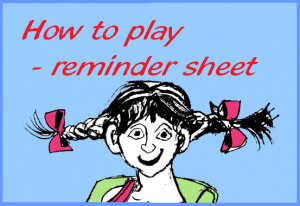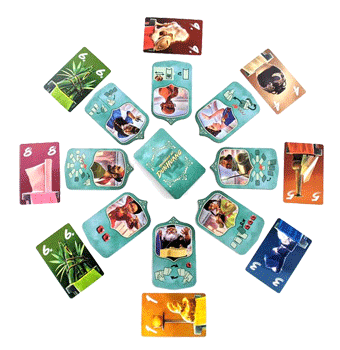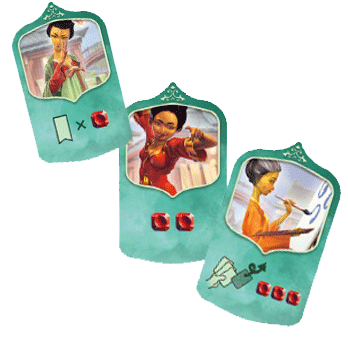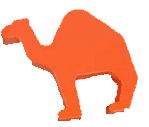
A mini rule-leaflet for each player. 😊
I’m sure Eric would approve of these notes
(he gave it 7.75 in his excellent review).

A good-fun game – with plenty of competitive opportunity.
The city of Dunhuang lies in north-west China. It was a point of vital importance for centuries, resting on the crossroads of two major trade routes of the vast Silk Road network. But, as revealed in Dunopedia, the city went into sharp decline when Chinese trade with the outside world moved to the country’s Southern sea routes: so much so that the ancient Silk Road was officially abandoned during the Ming dynasty.
But don’t let that bad news spoil what can be a very enjoyable
and competitive game. 😃
You still can act like a canny mediaeval merchant, picking up goods a-plenty, and managing them, your money, and your accumulated badges of prestige to become the smoothest, slickest, silkiest merchant in town.
You can end up this way by achieving one of two outcomes.
First – if you can establish yourself so strongly as to be able to push forward as the majority holder of four different types of goods in your shop, and hold four different types of goods in your hand, the game halts immediately – with you as Mr. Bigshot (or is it Miss, Ms., or Mrs.).
Alternatively, the game ends a little less spectacularly when there are no more cards left to refill a gap in the market with goods. In either case. there’s certainly a demand upon you to play with tactical and strategic attention.
So, what happens when you come to an ‘ordinary’ end.
The holding of goods and prestige are big issues … you’re merchants after all … ‘self made men’, no less .. 😃
► Prestige was so important to the aspirant merchant classes of mediaeval times, though it matters nought to us today, of course.
Every token of precious prestige that you’ve acquired is worth one victory-point.
►Then we have the other dimension that’s so close to mercantile hearts, which is who’s got most goods on display in their shop.
One-upmanship here is worth a welcome two points for every majority token that’s held.
► To round it all off, the goods held in hand may score victory points: but perhaps not. (It’s detailed in the rules.)
So how does the game work? How do the wheelers and dealers thrust towards victory?
Well, there’s a market area in Dunhuang, where merchants can pick up cards that show items of ten different types of goods that travelled the Silk Road. The goods include gold (of which there is but one item), silk (of which there are ten items),
and paper (eight items).
The number of items of goods ranges from one to ten.
There are eight items of goods up for grabs in the market,
and there are likely to be several items of the same goods
at any one time.

The items that are available in the market can be collected and either placed on display within the merchant’s shop, or retained in hand: there are potential benefits from both.
If at any time a merchant’s shop is displaying most items of one of the goods, they acquire a majority token – a bit like a five-star seal of approval from one of those internet review sites (but this one’s genuine … oh yes!)

An item of goods sits at the feet of each of the eight characters who mingle in the market place: including a Painter, a Dancer, and even a Princess.
There’s more!
Each character you come into contact with offers you a special treat by way of an action that you can take if you want to: a sort of bonus. The Princess, for example, allows you to pick up a prestige token for every type of goods you hold as the major-merchant (holding majority tokens in your shop). The Painter, on the other hand, allows you to return one item of goods from your hand to the deck, and pick up three prestige tokens.
Being double sided, with slightly different ‘bonuses’ on each, characters offer different opportunities according to how they’re laid out on the table, so there’s no predictable pattern from game to game.
This unpredictability is heightened by the fact that the items of goods that sit at their feet, which merchants can collect when they drop in on a character, is constantly changing.
Some complexity comes in here, since it’s very important (if you’re playing to win) to keep an eye on what character you may be able to reach at your turn. And that demands that you appreciate the benefits that characters will confer – you may find the FunGames reminder sheet (above) useful here.
But how, I hear you ask, do players get to cosy up to these characters? There may be someone (and their goodies) that you’re just dying to meet – so how do you do it?
Can you believe it? Yes, there’s a camel in the market place.
The camel’s used as the movement-piece, allowing players to move clockwise from one character to another. The idea of being trampled by a camel doesn’t appeal at all to me: enough to give anyone the hump! But one assumes that being walked over by a camel was all the rage
in mediaeval Dunhuang.

So, once having landed the camel on an unsuspecting character, players can take the item of goods sitting at their feet. Then they’re allowed either to take advantage of the special actions that the character offers, or to take three coins – and money will be needed to fuel the scramble for superiority. Everybody starts off with a supply of course.
Whichever way they choose, it’s a gainful experience for the merchant who moved the camel: never painful. Sometimes, though, it’s not so nice for their opponents, because one or two characters allow the player to swap cards with other merchants: it doesn’t take much guessing to work out that the player’s going to try to gain further advantage by doing so.
So there we are: that’s it. Simple !
– kick the camel into action
– collect goods
– undertake an action or grab some cash
– check to see if you’ve won yet
– replenish the market.
Brought to us by Mandoo Games (mandoo is Korean for dumpling, by the way).
A competitive and good fun game …
- short setup time
- some luck of course, but enormous opportunity for strategy and tactics play
- high demand for attention to play-actions and options ahead
- rules to hand or a reminder sheet about what characters can offer is essential
- definitely replayable … exciting
- may take a game to get used to it, though it’s not complex

